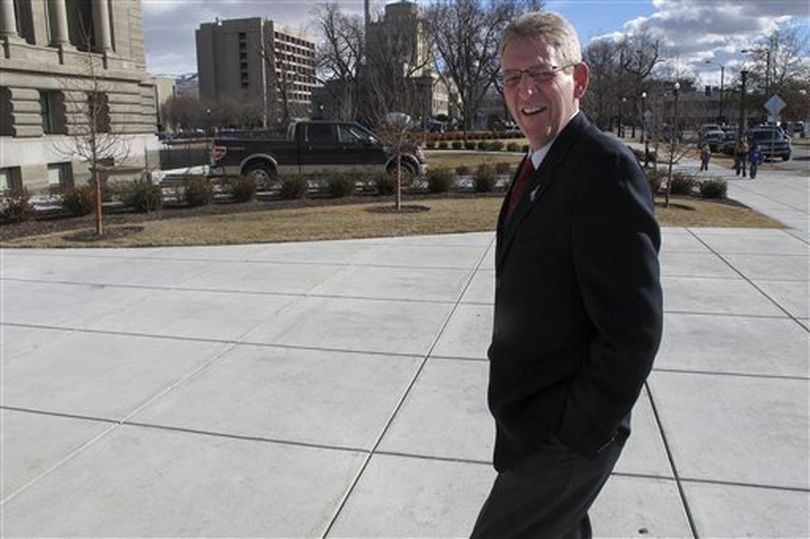The Legislature’s last cigarette smoker…

In a state Legislature that used to be filled with clouds of cigarette smoke, there's now only one state lawmaker who regularly steps outside for a smoke: Rep. Bob Nonini, R-Coeur d'Alene. There also are a scattering of cigar aficionados, a few discreet chewing-tobacco users and at least one pipe smoker, reports AP reporter John Miller, but far fewer legislators smoke than even the 16 percent of Idaho adults who puff cigarettes, according to the Centers for Disease Control and Prevention. Miller reports that the Capitol's dwindling population of tobacco users today stands in stark contrast to the 1970s, when smoking was so prevalent even inveterate abstainers gladly suspended House Rule 40 — the one forbidding smoking on the floor — just to keep business moving. Click below for Miller's full report.
Idaho rep is Capitol's last cigarette smoker
By JOHN MILLER, Associated Press
BOISE, Idaho (AP) — Standing outside the Capitol on a brisk January afternoon, Rep. Bob Nonini cups his hand deftly to shelter a cigarette — not from the wind, but from a camera.
The Coeur d'Alene Republican and House Education Committee chairman has the distinction of being the lone Idaho lawmaker who still regularly, if bashfully, steps outside for a smoke.
"This is private," Nonini says, declining further comment this week.
His solo status in Idaho's Statehouse underscores a decades-long transformation in American culture. But despite a near absence of smokers in the Republican-dominated Legislature, don't hold your breath in anticipation of a hike to the cigarette tax this year, even with about a quarter of lawmakers belonging to the Church of Jesus Christ of Latter-day Saints, which forbids tobacco use.
Most Idaho conservatives have a stronger aversion to government overreach and tax hikes than they have to cigarettes, even ex-smokers such as Challis Republican Rep. Lenore Barrett.
"What we're doing is whipping on folks who are making stupid choices," Barrett says. "They have a right to make those stupid choices."
Highlighting how deeply those sentiments run, Democrats last year failed to win even a hearing when they proposed raising cigarette taxes from 57 cents to $1.25 per pack.
The smoke has been fading from the Capitol since the 1980s, when Rep. Lyndon Bateman says he regularly turned green from the gray clouds that filled closed-door Republican caucus meetings.
"It made me sick," says Bateman, who served five House terms from 1977 to 1986 before his 2010 re-election. "At least from this perspective, we've made a lot of progress."
Nonini is not alone among Idaho lawmakers in his use of tobacco, even if he no longer has anyone to catch regular smoke breaks with. In Idaho's House and Senate, there are a scattering of cigar aficionados, a few discreet chewing-tobacco users and at least one pipe smoker.
"Captain Black," says Twin Falls Republican Rep. Leon Smith, revealing his pipe tobacco of choice.
Still, far fewer legislators smoke than even the 16 percent of Idaho adults who puff cigarettes, according to the Centers for Disease Control and Prevention.
The Capitol's dwindling population of tobacco users today stands in stark contrast to the 1970s, when smoking was so prevalent even inveterate abstainers gladly suspended House Rule 40 — the one forbidding smoking on the floor — just to keep business moving.
Otherwise, smokers would rush for the exits, grinding the gears of public policy making to a halt, says former Democratic Rep. Russ Westerberg, who served from 1974 to 1978 and now lobbies, including for the Cigar Association of America.
"There wasn't hardly a place in the Capitol when you couldn't smell smoke," says Westerberg, a non-smoker.
Former Rep. Bill Roden says when he served from 1961 to 1968, "It was probably 50-50 smoking-non-smoking."
By 1992, Capitol rules forbid smoking in the building's public areas, but still allowed officials to smoke in their private offices.
But that year a fire touched off by a cigarette butt in trash can inside Attorney General Larry EchoHawk's offices, caused $3.2 million in damage and nearly delayed the Legislature.
Lobbyist Pat Sullivan recalls the days of getting hundreds of free packs of cigarettes from his client, R.J. Reynolds, to distribute to legislators and other state officials. These goodwill handouts ended in 1998, after the massive tobacco settlement between states and manufacturers, Sullivan says.
The American Cancer Society Cancer Action Network is planning to introduce similar legislation to last year's failed Democrat cigarette tax hike.
"What is surprising to me is, they know what the burden is, they know what can be done to fix it, and it's still struggle," says Heidi Low, cancer society lobbyist.
The new plan is meant to discourage kids from starting, as well as raise $50 million for tobacco cessation and cover tobacco-related health care costs usually paid for by taxpayers.
If the measure isn't snuffed out by House conservatives, Senate President Pro Tem Brent Hill, R-Rexburg, says there's reason for optimism. "It has a decent chance of passing over here," he says. Hill, whose son did not smoke but died of lung cancer, sponsored the Clean Indoor Air Act in 2004 that banned smoking throughout the state in most enclosed public spaces.
As recently as last session Nonini had a pal to puff with on the Capitol steps, but Priest Lake Rep. Eric Anderson says he quit in on the assembly's final day, cold turkey.
Now, the four-term Republican shows off his smartphone app tracking the days, hours, minutes and seconds since he quit in April — and how much money he's saved.
Last week, it was $2,903.81 and counting. "The more I tell people about it, the more pressure there is for me not to start smoking again," Anderson says.
And even Nonini isn't unsympathetic to its dangers. His bill, to forbid so-called electronic cigarettes that vaporize nicotine-laced liquid into an inhalable mist from being sold to kids, passed the House 68-0 on Thursday.
Copyright 2012 The Associated Press.
